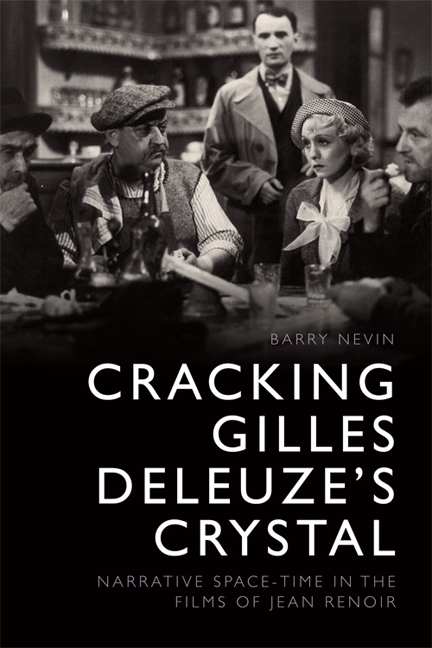Book contents
- Frontmatter
- Contents
- List of Figures
- Notes on Style
- Acknowledgements
- Preface
- Introduction
- 1 Theatrum Mundi: Framing Urban Dynamics in Renoir's Paris
- 2 From Desert to Dreamscape: Viewing Renoir's Rural Landscapes as Spatial Arenas
- 3 Portraying the Future(s) of the Front Populaire
- 4 Renoir's Crises Anti-Réalistes: Framing le Temps Gelé
- Conclusion
- Appendix: Corpus Breakdown
- Notes
- References
- Film Index
- General Subject Index
3 - Portraying the Future(s) of the Front Populaire
Published online by Cambridge University Press: 01 May 2021
- Frontmatter
- Contents
- List of Figures
- Notes on Style
- Acknowledgements
- Preface
- Introduction
- 1 Theatrum Mundi: Framing Urban Dynamics in Renoir's Paris
- 2 From Desert to Dreamscape: Viewing Renoir's Rural Landscapes as Spatial Arenas
- 3 Portraying the Future(s) of the Front Populaire
- 4 Renoir's Crises Anti-Réalistes: Framing le Temps Gelé
- Conclusion
- Appendix: Corpus Breakdown
- Notes
- References
- Film Index
- General Subject Index
Summary
We must address a relational politics for a relational space.
– Doreen Massey, For SpaceOur great Jean, if he had a heart for the left, had no head for politics.
– Roger LeenhardtIntroduction: Theory and Texts in Context
By analysing the mise en scène of space-time in Renoir's Front populaire output, this chapter argues that Le Crime de Monsieur Lange (1936), Les Bas-fonds (1936), and La Grande Illusion (1937) articulate Renoir's lack of confidence in the new future envisioned by his communities. In particular, this analysis demonstrates that the subjugated social groups featuring in each of these films are helpless to comprehensively apprehend or overcome the hegemonic social structures that striate space. Apart from representing some of the most aesthetically audacious work of their director's career, Renoir's films of this period implicitly occupy a central position in Deleuze's conceptualisation of Renoir's crystalline oeuvre. Asserting that Renoir is the director who came closest to conveying ‘an acute awareness of the identity of liberty with a future, be it collective or individual’, Deleuze proceeds to ground the director's outlook in ‘Renoir's political conscience, the manner in which he conceives the French Revolution or the Front populaire’. Deleuze's discussion of the relationship between Renoir's ideological messages and shooting style in his films is surprising within the context of a work that largely elides such discussions and generally depoliticises Renoir's mise en scène, and testifies to the undeniable impact of Renoir's engagement politique on his social and aesthetic development. At its peak, the Front populaire introduced collective contracts, salary increases averaging 12 per cent, a forty-hour working week, and paid annual holidays. Although Deleuze's optimistic statement necessarily simplifies both Renoir's involvement with the Front populaire and Renoir's mise en scène, his comments on Renoir's political affiliation remain valuable nonetheless, as they suggest a direct link between Renoir's contemporary political outlook and the range of futures available to Renoir's characters.
- Type
- Chapter
- Information
- Cracking Gilles Deleuze's CrystalNarrative Space-time in the Films of Jean Renoir, pp. 99 - 140Publisher: Edinburgh University PressPrint publication year: 2018



